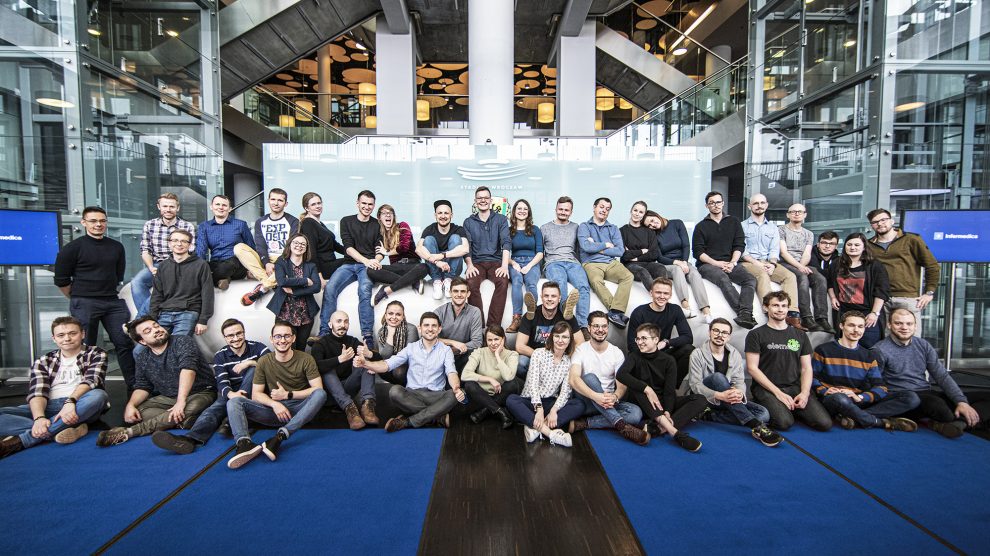Emerging Europe’s start-up scene is thriving: new money and new ideas are coming onto the market all the time. To keep you up to date with the latest investments, innovations, movers and shakers, each Monday Emerging Europe brings you a round-up of the region’s start-ups which recently closed financing rounds, sealed partnerships, or dropped new innovations.
Infermedica: Polish healthtech firm raises 26.5 million euros to expand its AI-powered platform
Polish digital health company Infermedica (whose team is pictured above) has raised more than 26.5 million euros for its AI-driven platform offering solutions for symptoms analysis and patient triage.
The funding was led by One Peak and included contributions from the European Bank for Reconstruction and Development (EBRD), Heal Capital, Inovo Venture Partners, and Karma Ventures.
Founded in 2012 in Wrocław, Infermedica helps insurance, healthcare, telemedicine and pharmaceutical companies increase efficiency, improve patient flow, and reduce costs. It makes it easier for such companies to pre-diagnose, triage, and direct patients to appropriate medical services with its AI-powered system of digital symptom-checks.
The company will use the funding to further develop the platform, aiming to add new modules to fully cover their primary care journey.
Furthermore, Infermedica will expand their global, remote-first team of healthtech and medical experts. In 2021 alone, Infermedica’s team grew by 80 per cent and now includes 180 physicians, engineers and data scientists.
According to Piotr Orzechowski, Infermedica’s CEO and co-founder, the funding will also help the company increase their global presence.
“To date, we’ve spent over 60,000 hours of physicians’ work to build one of the world’s most advanced medical knowledge bases of diseases, symptoms, and risk factors,” Orzechowski says. “We will deploy the new funds to execute our vision of making primary care more efficient and affordable by creating constantly improving AI technology for everyone on the planet.”
MX Labs: Estonian start-up raises two million US dollars to develop cutting-edge diagnostic technology
MX Labs, an Estonian start-up aspiring to help people with their health by providing them with precise and accessible digital diagnostic solutions, has raised two million US dollars in a funding round to develop the next generation of AI-driven health and wellness technology.
Leading the round was Finland-based Superhero Capital, and joining them were several existing investors such as Verge HealthTech Fund and SMOK Ventures.
By turning smartphones into diagnostics tools, MX Labs offers to put personalised health diagnostics in everyone’s pocket. Shen.AI, the company’s platform, combines computer vision, advanced vital signs processing, and the power of Artificial Intelligence for accurate health and wellness monitoring.
Available within mobile app Heart Monitor, the technology allows the user to determine his or her heart rate and blood pressure by scanning their face for one minute. More cardiovascular as well as mental health markers will soon be added thanks to the influx of the newly-gained capital.
“Our goal is to provide people with easy-to-use tools for prevention and self-care, accessible through the devices they own and use,” says Remi Kościelny, co-founder and CEO of MX Labs. “Going further, we want to increase the potential of telemedicine by providing a medically certified diagnostic solution.”
Przemek Jaworski, the company’s co-founder and CTO, says that the plan is to expand and further customise the computer vision algorithms and deep-learning architecture of the Shen.AI platform.
“We plan to add new functionalities such as emotional state detection, providing early diagnosis of mental health conditions and disorders. We also plan to invest in high quality data acquisition, external collaborations with scientific institutions and medical certification,” Jaworski adds.
Fusebox: Estonian start-up teams up with eMabler to balance the energy grid via EV charging
In another instance of businesses collaborating across the Gulf of Finland, Tallinn’s Fusebox, a virtual power plant provider, is joining forces with Helsinki’s eMabler, an electric vehicle charging start-up, to turn electric vehicles into virtual power plants.
The joint solution reduces energy costs, giving fresh business opportunities to owners of electric vehicle charging stations. It also allows them to contribute to a greener, more sustainable environment.
“Reducing the charging speed on an electric vehicle charger can make you money while reducing CO2 emissions,” says Kristian Lahtinen, Country Manager for Finland and Sweden at Fusebox.
Fusebox provides grid stability services in Nordic and Baltic markets, effectively functioning as a bridge between consumers and energy markets to save on energy costs and reduce CO2 emissions. On top of contributing to a greener society, their customers’ electrical devices earn revenue without interrupting their core business.
According to Visa Parviainen, Chief Ecosystems and Partners Officer at eMabler, electric vehicles stay unused for a long time at homes and offices, a fact which makes such places perfect for virtual power plant services.
“A typical electric vehicle will recharge fully in a few hours, so there is plenty of time to make up the short charging speed adjustments. This makes EV charging service ideal to support the energy transition,” Parviainen explains.
eMabler monitors and adjusts charging via a dedicated interface for virtual power plant platforms. Fusebox balances the electricity grid by combining the chargers into a virtual power plant and providing load reduction.
The market will soon support bi-directional charging, meaning that the batteries of electric vehicles will be able to feed electricity to grids and buildings.
OCCO: Design tech start-up from Estonia raises 750,000 euros to expand to new markets
Design tech start-up OCCO has recently raised 750,000 euros in the hopes of entering new markets and disrupting the status quo of the interior design industry.
The company’s mission is to digitalise the world of interior design and change the way design professionals source furniture. The company offers interior designers an AI-driven platform which saves up to 27 per cent of working time on product search and project management.
In other words, OCCO promises to save their clients a week’s worth of work every month.
Founded in 2016 and headquartered in Tallinn and Amsterdam, OCCO aims to disrupt outdated standards still holding strong in the interior design industry by bringing cutting-edge innovation into the field.
“Our extensive database helps interior designers and architects find suitable products or alternatives faster than ever, thereby saving time and money,” says Ander Sõõrumaa, OCCO’s co-founder and CEO.
The interior design industry still mostly uses paper catalogues, exchanges many e-mails to obtain product information, and sends out offers as PDF files.
OCCO’s platform, on the other hand, gives professionals direct access to manufacturers, trade pricing, and product’s technical files. The system’s AI uses deep learning and vision algorithms to analyse a dataset of product images and descriptions in order to come up with fully customised design solutions.
The company has increased its yearly revenue to 7 million euros, securing 250 users from Estonia and the Netherlands. The company works with customers ranging from start-ups to large international organisations, and has completed more than 1,000 projects for companies such as Bolt, Pipedrive, Nasdaq, Sorainen and Tallink.
Unlike many news and information platforms, Emerging Europe is free to read, and always will be. There is no paywall here. We are independent, not affiliated with nor representing any political party or business organisation. We want the very best for emerging Europe, nothing more, nothing less. Your support will help us continue to spread the word about this amazing region.
You can contribute here. Thank you.








Add Comment